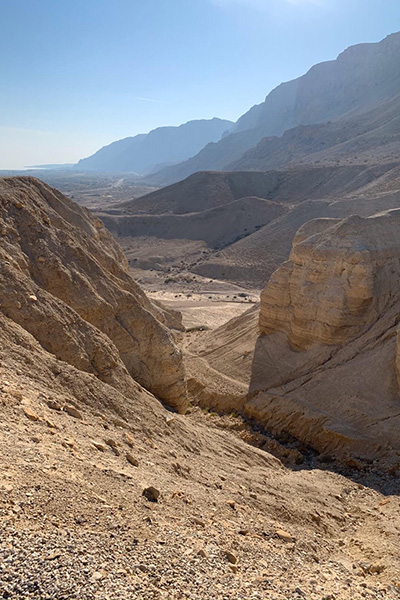
The 40 days of Lent represent a time of drawing apart from life as we normally live it out the other 325 days of the year. These 40 days between Ash Wednesday and Easter Sunday remind us of Jesus’ time in the wilderness prior to his earthly ministry (Mt 4, Mk 1, Lk 4). It also reminds us of other figures before Jesus who are associated with the desert: Moses, Elijah and the Israelites, all of whose stories are—interestingly—tied to Jesus in a rich typology (Deut 18:15, Mk 6:15, Mt 17, Lk 9, Hos 11, Mt 2). The desert is a wide-open space that carries multiple spiritual meanings. It has the appearance of a blank canvas, a space that seems deceptively void of activity, a place of nothingness and absence. Yet many biblical men and women bore the desert’s imprint in various ways, and these ways are open possibilities for the desert to leave its stamp on us as well. Lent, therefore, offers us opportunities to experience the desert as both privation and profit, as barrenness and fecundity.
For Jesus, the desert was a place of temptation and spiritual warfare, a place of vulnerability to the devil. This demonic warfare in the wilderness brought to light what would be a continuous theme throughout his ministry of healing, which frequently involved exorcism.
For Israel, the desert journey was a time of experiencing vulnerability and dependence. They encountered the tender love of God for his “son” (Ex 4:22), as also the frightening but thrilling ecstasy of entering into covenant with such a God. The desert can be a place of God’s self-revelation as ultimate provider and sustainer of physical life, feeding Israel with manna and quail, covering Israel’s lack with abundant provision; and his identity as Lord and sustainer of the community’s spiritual life through the giving of the Law.
If the desert is a place of God’s self-revelation, it is also such a place for our own self-revelation. For Israel and for us, the desert can be a crucible of critical self-confrontation, where we are forced to face harsh realities about ourselves. The Israelites learned that they were rebellious and disobedient children, grumblers and complainers—and we may not be far off those marks ourselves at times (1 Cor 10).
The desert can also be a place of sanctification and preparation, of being set apart as God’s servant. The prophets Elijah and Elisha waited in the wilderness, listening carefully for God’s voice to give them their next preaching commission, and training other prophets, preparing them for ministry (1 Sm 10, 2 Kings 1). Their fellow prophet—eight centuries into the future—John the Baptist, also carried out his preaching ministry “in the wilderness of Judea” (Mt 3:1). He was the forerunner of the Messiah and the “Elijah” who would announce the Day of the Lord, a message of woe and a call to repentance. Even as he preached, he remained in the desert, and the masses came out to him—penitent, with smitten hearts, desiring the Lord’s kingdom and vulnerable to God’s work. For these crowds, the desert was a place of repentance and preparation, as John faithfully carried out his mission to “make ready for the Lord a people prepared” (Lk 1:17).
Once people have been to and through the desert, borne along by God’s blazing, fiery light and protected by his canopy of cloud; fed generously and having had their thirst slaked by his provision; and having received his revelations of law, gospel and truth, the desert becomes a sought-out venue rather than a place to dread. It becomes a place of refuge, repentance and restoration; a welcome space for solitude, introspection, self-examination and a retreat for intimate time with our Maker, listening for the still voice of the One who loves us and has invited us to be his covenant people.
What will your desert journey look like this season, and what will it accomplish in you? Is God calling you into the desert? Do you find yourself already there, having been thrust suddenly into it? Open yourself up to be refined and prepared, sanctified and taught, convicted and restored, loved and nurtured, and always guided along by the loving Shepherd, the same “Shepherd of Israel” who leads his people to and through the wilderness (Ps 80).
Dr. Stefana Dan Laing is assistant professor of divinity at Beeson Divinity School, where she teaches in the area of spiritual formation.
